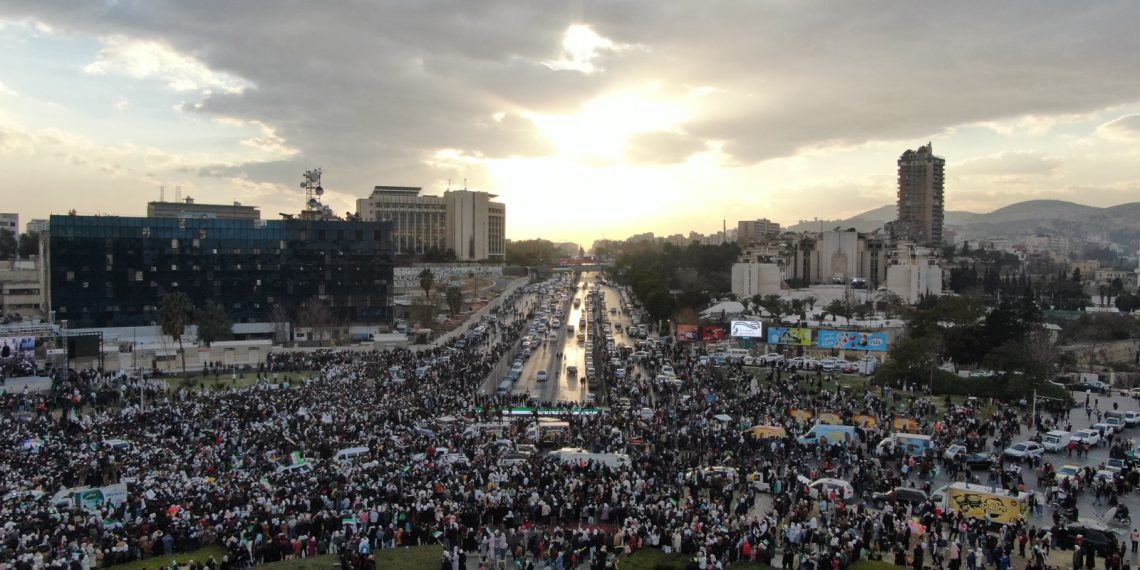In a significant diplomatic milestone, a high-level U.S. delegation led by Barbara Leaf met with Ahmed al-Sharaa, head of Syria’s “Military Operations Administration,” to discuss the country’s future following the fall of Bashar al-Assad’s regime. Leaf described the meeting as an opportunity to “rebuild the country” through direct engagement with Syrians, while al-Sharaa pledged to combat terrorism and stabilize the region. This meeting reflects Washington’s pragmatic approach to navigating Syria’s complex post-conflict landscape.
A Shift in U.S. Policy
Following the meeting, the U.S. State Department announced the cancellation of a $10 million bounty previously offered for information on al-Sharaa (also known as Abu Mohammad al-Jolani). While rewards for combating ISIS remain active, this decision underscores a recalibration of U.S. policy toward engaging influential Syrian actors. Leaf emphasized that the dialogue aligned with principles agreed upon with U.S. partners in Aqaba, focusing on countering terrorism and preventing its resurgence, commitments that al-Sharaa affirmed.
Political science professor Ihsan al-Khatib highlighted the pragmatic nature of both the U.S. and al-Sharaa’s approaches, drawing parallels with Washington’s cautious dealings with Islamist movements after its controversial withdrawal from Afghanistan. The meeting also addressed the principles of power transition in Syria, the continued fight against ISIS, and the fate of missing Americans, including journalist Austin Tice—an issue Leaf described as a priority for President Biden.
Broader Implications
The visit, the first official U.S. mission to Damascus since Assad’s fall, signifies a strategic shift in U.S.-Syria relations. Analysts like Marco Massad view this as acknowledgment of al-Sharaa’s de facto authority due to his military and political influence. Massad suggested the move might pave the way for revisiting the designation of Hay’at Tahrir al-Sham (HTS) as a terrorist organization, contingent on its actions under al-Sharaa’s leadership.
According to political analyst Hossam Taleb in Damascus, HTS has made notable ideological and behavioral revisions that warrant U.S. consideration. He viewed the cancellation of the bounty as a step toward removing HTS from terrorism lists, potentially opening avenues for political and economic engagement.
European Perspectives and Regional Impacts
European nations, particularly France, have cautiously welcomed the fall of Assad’s regime and are awaiting concrete steps from Syria’s new authorities. European Council President Charles Michel hailed the regime’s collapse as a chance for Syrians to achieve peace and freedom, while EU officials emphasized safeguarding minority rights and enhancing women’s empowerment.
The European Union has also initiated humanitarian efforts, including plans for an airbridge via Turkey to deliver aid, signaling readiness for broader collaboration on reconstruction and security once trust with Syria’s new leadership is established.
Toward a New Phase in U.S.-Syria Relations
The U.S. delegation’s visit marked the beginning of what could be a transformative period in international relations with Syria. As Washington and Europe seek to balance stability and reform, the response of Syria’s new authorities will determine the success of these efforts in fostering peace and rebuilding the nation.
This article was translated and edited by The Syrian Observer. The Syrian Observer has not verified the content of this story. Responsibility for the information and views set out in this article lies entirely with the author.


